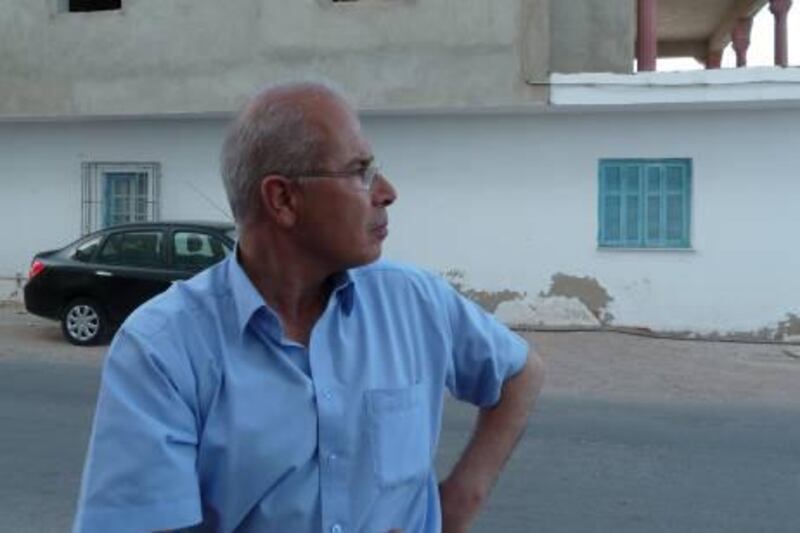ZARZIS, TUNISIA // Ahmed Faouzi Khenissi, a pharmacist in the Tunisian port city of Zarzis, never wanted to be mayor. But thanks to the obscure workings of politics in pre-revolution Tunisia he ended up with the job anyway.
"As I had no political experience, maybe they thought they could direct me as they wished," Mr Khenissi says.
"They" were local bosses in the Constitutional Democratic Rally (RCD), the ruling party and political machine of Zine el Abidine Ben Ali.
In January, the president and his regime were swept away by a wave of protests. Now, as Tunisia tries to remake itself, Mr Khenissi hopes to use his position to improve life in his long-neglected city.
From the sleepy harbour, with its piles of fishing nets and a shipyard crowded with beached hulks, Zarzis slopes up gently before giving way to desert. Ten kilometres north is a seaside tourist zone, set aside by the state for luxury hotels. Zarzis, however, received little state investment from Mr Ben Ali's regime, Mr Khenissi says.
His family has lived in the city for at least five generations, descended from local notables. After university studies in France, he opened a pharmacy in 1985.
"I never wanted to enter politics," he says. "I didn't want to be caught in the machinery of a party."
However, politics unexpectedly came for Mr Khenissi in May last year. He was watching a football match on television one evening when the phone rang.
"Congratulations!" said the caller. Didn't Mr Khenissi know? He was heading the RCD list for city council nominations.
"What's going on?" said Mr Khenissi's wife, overhearing the conversation. "What list are you talking about?"
"The RCD list is out, and it seems I'm at the top," he told her.
With opposition parties banned or marginalised by Mr Ben Ali's regime, nomination by the RCD was a de facto election.
More callers offered congratulations. At first Mr Khenissi was incredulous. He was not even an RCD member. But that night he lay awake in bed. What if the news were true?
Refusing the nomination would surely anger the RCD, he thought. "So I decided to enter the mouth of the wolf."
On May 19, 2010, he was officially named mayor. The RCD promptly saddled him with an adviser who tried to thwart him at every turn, he says.
Nevertheless, he began his tenure with a round of political appointments based on merit rather than party loyalty.
"The first district head I chose was a woman," he says. "That had never been done before, and not everyone was pleased."
When revolution shook Tunisia in January, demonstrators called on Mr Khenissi's advisers to leave. "As for me, they demanded that I stay," he says.
He has since struggled to keep Zarzis's municipality functioning as law and order have broken down. In March, he gave city employees open-ended contracts aimed at heading off labour strikes that have crippled other cities.
"Overall, I have two objectives," he says. "The first is to instil civic spirit in ordinary people." The second is to convince Tunisia's leaders to reverse the city's neglect by upgrading infrastructure.
Since last year, Mr Khenissi has worked to assess key needs and is now bombarding the government with reports.
"For example, the port is functioning at 20 to 25 per cent and should have been dredged out years ago," he says. "There's no economic activity in the Economic Activity Park - the customs-free zone at the port. It's operating at 10 per cent of its capacity."
While official figures put Zarzis's population at 67,000, Mr Khenissi reckons it is closer to 130,000. Youth unemployment in the city could reach as high as 28 per cent, he said.
Tunisia's interim government hopes to win international support for a $25 billion (Dh91Bn) fund to help revitalise the country's economy, which has suffered since January as political turmoil has spooked tourists and foreign investors.
For Mr Khenissi, much also depends on what political system will take shape after elections in July for an assembly to write a new constitution. He links developing provincial areas with ending Mr Ben Ali's practice of foisting appointed officials on them.
"Nothing can change until we have an elected governor who is from the region," he says.
Mr Khenissi, meanwhile, is looking forward to the day when he can return to life as a pharmacist. His duties as mayor leave no time for his hobbies - cycling, jogging and wind-surfing.
Recreation now comes in the form of one bike ride a week: a tour through Zarzis every Sunday to keep an eye on what needs doing.
"I'm not one to drive around in a car," he says. "When you're on foot - or in my case, on a bike - people feel that the mayor is one of them."





